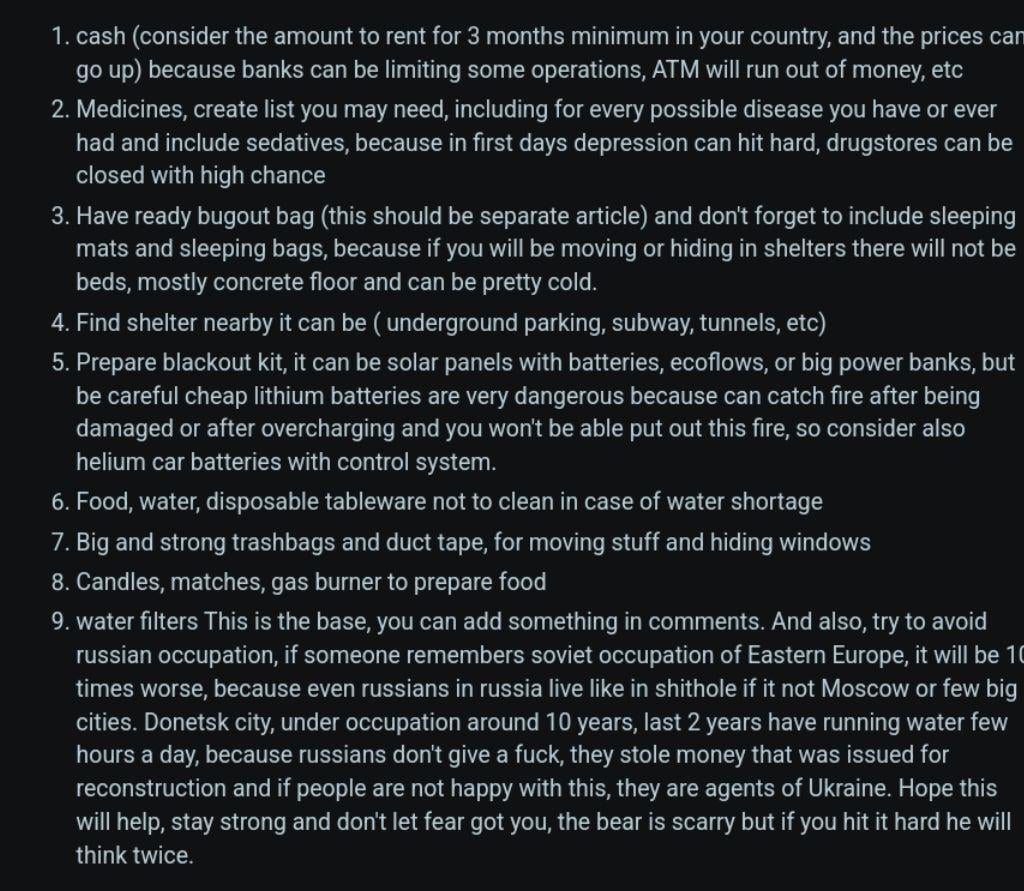Thank you for all these links and information!
SMFers
An inclusive Lemmy network for progressive preppers; inclusive community for all women, LGBTQIA+, and men. Our goal is to provide a place for like-minded individuals to come together during trying times & share ideas about prepping, homesteading, home security, activism, legal self defense/hunting, & more.
FEMA Nuclear Planning guide: https://www.fema.gov/sites/default/files/documents/fema_nuc-detonation-planning-guide.pdf
Protect & Survive: https://digitalarchive.wilsoncenter.org/document/protect-and-survive This pamphlet from GB (1980) describes what you can do in the event of a nuclear attack if you don't have a shelter nearby. It was intended to be distributed to households if the risk of nuclear war was great. Good points, not only for nuclear war but in general. Keep in mind that it's from 1980 so not up to date.
Essential Supplies:
Water:
Store at least one gallon of water per person per day for a minimum of three days.
Consider gravity-fed water filters, like the Berkey system, for long-term purification needs.
Food:
Stockpile non-perishable items such as canned goods, dried pasta, beans, rice, and oats.
Include high-calorie foods like peanut butter and nuts.
Multivitamins can help address potential nutritional gaps.
Medical Supplies:
Assemble a comprehensive first aid kit with bandages, antiseptics, pain relievers, and any necessary prescription medications.
Include potassium iodide tablets to protect the thyroid from radioactive iodine exposure in nuclear events.
Personal Protective Equipment (PPE):
Acquire gas masks with appropriate filters to protect against airborne contaminants.
Use coveralls or disposable suits, nitrile gloves, and protective goggles to shield against radiation or chemical exposure.
Radiation Detection:
Equip yourself with a Geiger counter to monitor radiation levels.
Personal dosimeter cards can help track cumulative radiation exposure.
Power and Lighting:
Store flashlights and battery-powered lanterns with extra batteries.
Consider solar chargers or hand-crank generators for renewable energy sources.
Communication Devices:
Keep a battery-powered or hand-crank radio to receive news and emergency broadcasts.
Two-way radios can facilitate communication if cell networks are down.
Cooking Supplies:
Obtain a portable camping stove with sufficient fuel reserves.
Manual can openers and basic cookware are essential for meal preparation.
Sanitation and Hygiene:
Stockpile items like soap, hand sanitizer, toothpaste, and feminine hygiene products.
Store household bleach for water purification and cleaning purposes.
Clothing and Shelter:
Have weather-appropriate clothing, including thermal wear and sturdy boots.
Maintain sleeping bags or blankets to ensure warmth.
Protecting Electronics from EMPs:
Faraday Protection:
Use Faraday bags or cages to shield critical electronics from EMP effects.
Store essential devices like radios, flashlights, and medical equipment in these protective enclosures.
Additional Considerations:
Important Documents:
Keep physical copies of identification, medical records, and insurance documents in a waterproof container.
Emergency Plans:
Develop and practice a family emergency plan, including communication strategies and designated meeting points.
Training and Skills:
Learn basic first aid and survival skills to enhance self-sufficiency.